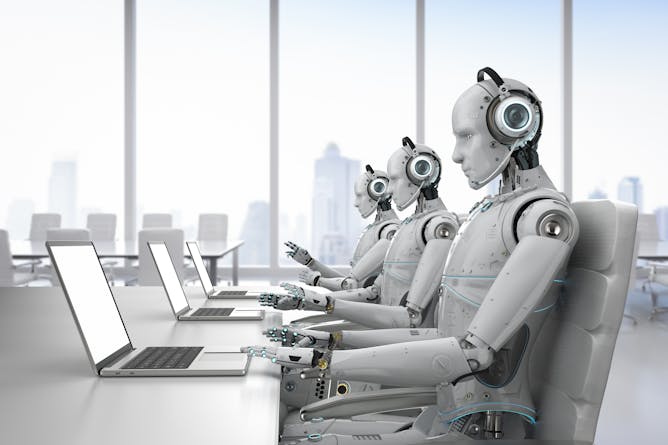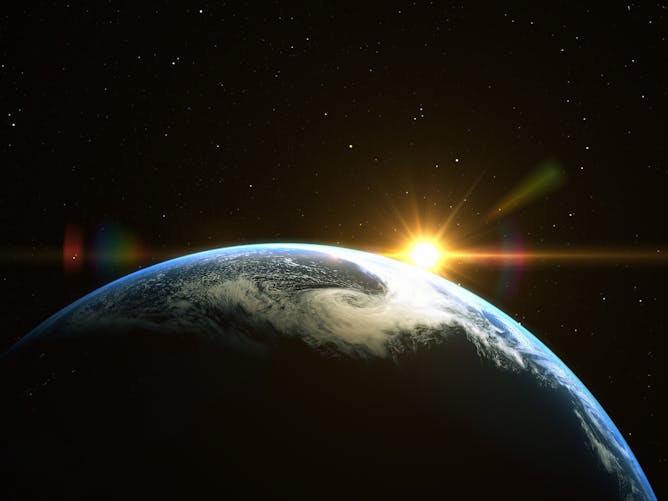|
|
|
|
Have you ever worried that some technological advancement – say, some type of artificial intelligence program – could put you out of work? In 2021, image generator DALL-E was released, followed by the AI-powered text generator ChatGPT last year. Both tools put the spotlight squarely on artists and knowledge workers. 2023 is expected to bring GPT-4, the next leap in AI that can produce convincing text.
We asked five artificial intelligence researchers what these new AI tools mean for people who create visual art and those who absorb information and write about it. The answers cover a good deal of nuance between “a machine is going to replace you” and “you’re about to become super productive.”
Last year several nonprofits advised consumers not to eat lobster. The reason: critically endangered North Atlantic right whales are dying when they become entangled in fishing gear, and lobster fishing puts tons of rope in waters where right whales swim.
Blake Earle sees parallels in past campaigns that led tuna fishermen and shrimpers to adopt safer gear, reducing harm to dolphins and sea turtles. But it’s not clear whether North Atlantic right whales can hold on till the lobster industry agrees to a similar fix.
|

|
Eric Smalley
Science + Technology Editor
|
|

Lynne Parker, University of Tennessee; Casey Greene, University of Colorado Anschutz Medical Campus; Daniel Acuña, University of Colorado Boulder; Kentaro Toyama, University of Michigan; Mark Finlayson, Florida International University
Now that AI systems can generate realistic images and convincing prose, are creative and knowledge workers endangered or poised for productivity gains? A panel of experts says it’s not so clear-cut.
|

Blake Earle, Texas A&M University
To fish the oceans sustainably, nations must reduce bycatch, or accidental catches. But fishermen often resist changing gear or techniques that kill nontargeted species.
|
|
|
-
Justin Stebbing, Anglia Ruskin University
The UK government announced that it is partnering with BioNTech to trial personalised cancer vaccines.
-
Pippa Morgan, Duke Kunshan University; Andrea Ghiselli, Fudan University
Countries that lean towards democracy are less likely to welcome Chinese labourers.
-
Emma Beckett, University of Newcastle
Low carb diets are popular and pasta is often in the firing line for those who think it might contribute to weight gain. But your favourite dinner is being unfairly maligned!
-
Keith Diaz, Columbia University
Short, frequent walks throughout the day are key to helping prevent the harmful effects of a sedentary lifestyle.
-
Libby (Elizabeth) Sander, Bond University
While there’s nothing new about the return-to-work blues, few companies have any strategy to facilitate readjustment to work after vacation.
|
|
|
|

Sylvanus Kwaku Afesorgbor, University of Guelph; Ruby Acquah, University of Sussex; Yohannes Ayele, University of Sussex
Manufacturing firms exposed to increased Chinese competition employed fewer female production workers than men.
|

Amir AghaKouchak, University of California, Irvine
Mudslides start with destabilized land, often from wildfires, and then rain drives the cascading disaster.
|

Wesley Morgan, Griffith University
Has climate action bogged down? Hardly. Nations are redoubling their efforts in visible and less visible ways.
|
|
|
-
Jeffrey Fields, USC Dornsife College of Letters, Arts and Sciences
What are classified documents? Who gets to see them? What happens if they are released? A former State Department and Department of Defense staffer who had top secret clearance provides the answers.
-
Johann Kirsten, Stellenbosch University; Aart-Jan Verschoor, Agricultural Research Council; Colleta Gandidzanwa, University of Pretoria
The government’s approach to redistributing farmland has been mostly ineffective. Failure can be attributed to limited implementation, poor institutional capacity and corruption.
-
Grace C Roberts, University of Leeds
XBB.1.5, or ‘kraken’, can evade our immune systems better than earlier variants, and appears to be more infectious. But it’s not cause for alarm.
|
|
| |
| |
| |
| |
|
|
|
|
|
|
|